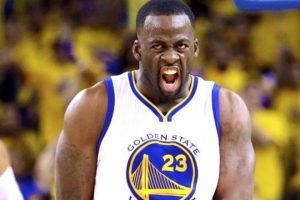
Much has been made about Kevin Durant’s free agency decision, and rightfully so. He’s the best available player in the league (aside from LeBron James, but he’s staying put) and his choice could significantly shift the NBA’s balance of power.
But there is one free agent who isn’t attracting nearly as much attention, and for obvious reasons: Dwyane Wade.
Wade is 34 years old, the same age Michael Jordan was when he commenced his second final season in 1997. He is admittedly not what he once was, which was one of the most dynamic, enjoyable, and productive players in a league that was and is chock-full of them. Wade’s injury-precipitated decline almost exactly coincided with James’ realization of his dream of winning an NBA championship, one he fulfilled in 2012 with a five-game triumph over Durant’s Thunder. Now, all three are free agents.
And, continuing with the Wade/Durant irony, who else remembers this Gatorade commercial? In it, Durant’s goes up for a dunk attempt but is thwarted by a younger, more athletic Wade. You can see the rest for yourself:
Pretty sick, huh? The one-minute spot ends with KD dunking on Wade and Dwyane waking up from his nightmare to start the process Durant just finished. Pretty fitting.
Just like with Durant, it was never thought that Wade could possibly leave Miami. However, he’s in serious talks with other teams, such as the Bucks and Nuggets, to leave the Heat behind. While he will probably stay in Miami like he has for the first 13 years of his career, there is a legitimate possibility that he could leave.
Leaving Miami for Denver or Milwaukee could not possibly be a basketball decision; rather, it would be a decision based on the Heat organization’s treatment of him even as he has taken repeated pay cuts to help the team attract free agents. Team president Pat Riley prioritized Durant and Hassan Whiteside before Wade, and he was right to do so. Both are younger and have more to give at this stage of their careers, and while Wade may feel disrespected by the team’s priorities, it’s hard to fault the Heat for thinking like they did.
But what does Wade have left in the tank for whichever team signs him? And what can those teams expect from a player so clearly entering the twilight of his career?
For one thing, the man they call Flash was significantly healthier last season. After missing 48 games in the prior two seasons, he appeared in all but eight games last year. Granted, his production is continually declining; his field goal percentage (45.6%) was the lowest of his career and he only averaged 19 points per game. However, his 74 games were the most he played in since 2010-11, when he was regarded as a legitimate sidekick to James instead of his second fiddle.
Another consideration for Wade is lengthening his career. After repeated knee injuries over the past few seasons, he’s probably looking for a situation where he may not have to do quite as much to carry his new team. While that situation is probably in South Beach, consider this: Wade’s usage rate (31.6%) ranked fifth in the NBA last season. Even worse, three of the four players ahead of him in that category (DeMarcus Cousins, Stephen Curry, James Harden) are all decidedly younger and better able to handle the rigors of an 82-game schedule. Asking less of Wade over the course of a full season would help him stay fresh and healthy for a potential playoff run.
But is there an actual fit in either Denver or Milwaukee? In Milwaukee, the answer is no, if only for logistical reasons. As the Bucks are currently constituted, they do not have the cap room to bring in Wade on a max contract or something similar to it. However, if the team decides that it wants to trade Greg Monroe, which is widely believed to be a strong possibility, it would then have enough cap room to pay Wade.
In Denver, a move to acquire Wade would be far more questionable. The Nuggets have several young players in their backcourt, including Emmanuel Mudiay and 2016 7th overall pick Jamal Murray. Signing Wade may very well mean getting rid of one or both of those players for the dual purpose of creating cap room and clearing out an already crowded backcourt.
There’s this angle, too: wouldn’t it be better for Denver and coach Mike Malone to let the team’s younger players develop? Parting with Murray or Mudiay would deny them of this opportunity, one that may not exist elsewhere. We should point out that Mudiay was really, really bad last year (9.9 PER). Nevertheless, he and Murray do have the opportunity to develop into solid players and core pieces of Denver’s future.
The best choice for Wade and his future, though, is clearly to stay in Miami. He has built an identity there and the Heat are by far the best team pursuing him. While he is understandably upset that Riley prioritized Whiteside and Durant over him, wouldn’t you do the same? Eventually, Wade should realize that Riley did what was best for the Heat organization, even if that came at the expense of the team’s most recognizable figure.
And Wade has still shown that he can be a very good player. He’s far removed from the days of driving to the basket with reckless abandon, often sacrificing his body to get baskets. This undoubtedly caught up with him and he’s definitely lost a step since that time in his career. But he has a track record of coming up big when it counts; after all, he singlehandedly carried Miami to its first NBA title in 2006.
Dwyane Wade is still a very good player, maybe the second best on the open market right now. But he, like everyone else, has been enveloped in the Durant sweepstakes.

